|
1966-1973
In January, 1966, before leaving for Philadelphia I took a two week adventure with a close friend at the time. He was leaving to serve his two years in New York City. We packed some clothes and camping gear in my Dad’s VW bug and drove nonstop to Florida.
That Florida trip was memorable in that it felt like I was beginning to take control of choices, to become more of an adult. It was my first step toward leaving home. We had my dad’s VW bug packed with basic supplies. We left early in the morning and arrived the next day by driving nonstop through the night. There was one scare in the middle of the night when my partner was driving and I was sleeping. I awoke with a sudden panic to see a truck heading toward us, in our lane! We passed at what seemed like the last minute. I don’t remember who was at fault and it was over in seconds. It happened in a work zone where the lanes were being rerouted. We arrived in Tampa and spent a little time with friends who were already in their alternate service requirement. Some of them were serving in an option called Voluntary Service that allowed for church sponsored community work. For the remaining trip we saw a few more friends, but much of our time was spent camping on Bahia Honda Key in a State Park. Our tent was on the sandy beach under an abandoned bridge, left from the historic Flagler East Coast Railway that once linked New York City to Key West. It was idyllic. We swam at night. We slept late and fished, eating what we managed to catch. We listened to a Miami radio station and heard Nancy Sinatra sing “These Boots are made for Walking” the first time. They played it several times a day. We took a day trip to Key West. Both of us were innocent, rural boys on our own so far from home. It was especially memorable knowing that we would be spending the next two years in the city, he in New York me in Philadelphia. I had been away from home for short periods of time before but this felt different. I was really moving out of my parent’s house and away from their scrutiny. I was saying goodbye to my father’s anxieties and my Mother’s fluctuation between mania and depression, what I now believe may have been her bipolar disorder. I believed that I was about to achieve the ability to live by my own rules and value judgments. The way, even as a young child, I had imagined that I would live. My life would be different from the life of my parents. Little did I know the degree to which I had been shaped by them. Their influence was clearly positive in some ways and in other ways not at all healthy. It would take a lifetime to work through much of their influence.
I struggled with feelings of confused identity, anxiety and obsessions. At the age of thirty-five I had my first therapy session with a friend who was a medical doctor and had limited training as a therapist. It was a fifty minute crying session. Apparently, I did not cry enough as a child! That was followed by about a year of therapeutic counseling that had limited success. I was forty years old before I would make real progress while in therapy with a brilliant psychologist.
I moved to Philadelphia in 1966. Both of my sisters lived in the city and I first moved in with Gerri, a similar arrangement to the one we had when I was in the eighth grade. Again I was quite comfortable living with her. In retrospect, while it was comfortable, it may not have been the separation that I needed to take first steps toward maturity. It was more like a half step. I only lived with Gerri a few months before moving in with my other sister Janice and her husband. I had a bedroom and a small studio on the third floor of their townhouse on York Street in the Kensington area in north Philadelphia. The front window looked across the street toward an abandoned factory and the back window looked at the tiny backyards filled with laundry, broken bikes and other rusted things. Janice and Galen’s children, Karen and David, were babies while I lived with them.
I had applied for a job at the Presbyterian Hospital, a qualified “alternative service” employer. I apparently did well enough on the employment application test to be hired as a nurse assistant or as it was referred to then, an “orderly.” On my first day I was introduced to an elderly African American man named “Maurice” who was assigned to my training in the work of being an orderly. I watched him shave a patient in preparation for surgery. He told me I would be expected to give enemas. Fortunately, someone, maybe Maurice, decided that I was not suited for that job as the very next day I was called in and asked if I would be willing to take over managing the supply room and receiving department. I was relieved and happy to be in a job that was more similar to the retail grocery business that I had experience with.
The Purchasing and Receiving Department at the Presbyterian Hospital at that time was run by a tough woman named Miss Wescott. Her assistant was Bill Sauter. I was taken to the basement of the hospital to an area that was sectioned off with a heavy wire fence and locked gate. I was introduced to another African-American named Joe Francis. Joe was in his mid-thirties and had worked in the supply room for many years. His job was to push a cart from the supply room throughout the hospital, delivering orders to the nursing stations and business offices. My job was to help fill the orders from inventory as they came to me and prepare them for delivery. At the same time I was to receive deliveries from outside trucks, unpack if necessary, and check against the order forms for errors. I then added the products to inventory or had them delivered directly to the appropriate recipient. At the end of the day, I filled out a receiving log and turned in a record of deliveries to the ordering department. It was just Joe Francis and me and together we were in charge.
At first, Mr. Francis didn’t want to talk to me. With as few words as possible he would indicate that I made a mistake in filling an order. If I asked a question, he ignored me or answered without facing me, with a quiet voice. I was not accustomed to speaking with African-Americans and found his speaking difficult to understand. I don’t think he knew that I would be there for two years and did not have the option of leaving. I was aware that he felt that I had been hired to a position above his and that it was unfair. Maybe it wasn’t fair, especially if he was not considered for the position. While we never became close friends, we soon settled into a comfortable and cooperative working relationship. It began to change when I covered his butt a few times when I could have done some damage. Since I answered the phone, it also helped when I learned to recognize the phone voice of his wife and girl friend and could tell him which one had called when he was out making deliveries.
Five days a week I took “the el,” elevated train on Front Street at Kensington. The “el” went underground at Market Street and I continued on to 39th. At rush hour, it was about a 40 minute ride. I had traded my 1963 Dodge car for a new 1966 VW beetle. It was the color of sand with a sun roof that wound open. When I didn’t ride the train to work I would drive. I was twenty when I was stopped by the Philadelphia city police for no apparent reason. After sitting in their car, checking records, they apologized and admitted they just thought I was too young to drive. I was immature in many ways and I also looked quite young. Instead of being in Viet Nam with a gun, shooting at people I didn’t know and had no reason to hate, I was living with my sister and had a safe nine-to five job. I probably would not have lasted five minutes in combat.
While I lived on the third floor of Galen and Janice’s row house in the Kensington area of Philadelphia, a few blocks from the Frankford station, I shared the space with Linford Martin, a church friend from my earliest memories. He was also serving his alternate service but at a different hospital.
Gerri had a 35mm Yashica camera. I decided I wanted to take some pictures of the way I was experiencing the “L”. I’m not sure why Philadelphia natives insisted on calling it the “L” because much of it was underground. It does form the shape of the letter “L” as it follows Front Street south aboveground until it makes a sharp turn, goes underground and heads west on Market Street. It was the underground part that I was most fascinated with because it was the most sensational. The lights came on in the cars and would flash on and off, sometimes staying off for several seconds, making it completely dark. When the train glided into the underground stations the signs and lights blurred past the windows. I ignored the instruction booklet for the camera and loaded a roll of 35mm film. I shot an entire roll in the subway train completely ignorant of basics like ISO, shutter and aperture settings. My high expectations were dashed when I picked up the processed film and there was nothing on the negatives. All the pictures were so underexposed that I had captured nothing of what was I was experiencing. I gave the camera back to my sister and did not use a camera with manual controls for another nine years when I was patient enough to study the basics. On the train, I went back to my favorite activity of people watching and subway surfing, standing and maintaining balance without holding on to anything. Simple pleasures!
Sometime during that first summer in Philadelphia, I took the bus to New York City for a weekend with my Florida trip friend. As soon as I got off the bus in New York I felt like I was in the center of the world. It was much more cosmopolitan than Philadelphia and I was excited by the fashion and art that seemed to be everywhere. The city was vibrating! That Saturday morning we went up onto the roof of his apartment and looked out over the city. After lunch we walked to Central Park. There was a free concert. It was “The Four Tops” or maybe “The Box Tops,” I really don’t remember the group. The sun was shining and the music was “groovy.” We sat in the grass with other people. Suddenly I felt the girl next to me reach over and take my hand. It was so unexpected, at first I thought it was an accident, but we were holding hands. I was so shy I didn’t look at her. I held hands and listened to music with a girl I never met and I didn’t see her face! It was like the “San Francisco Summer of Love,” but before I knew about that social movement. Later we went to Greenwich Village and the folk music was everywhere.
Soon, back in Philadelphia, I learned about LSD and marijuana but did not have any intention of trying drugs! “Head shops” were popping up and people were burning their draft cards. I went to a Pete Seeger concert and lots of people were handing out literature against the war and promoting socialist or communist movements. I had gone with a guy I met at work. He was very solicitous. Later I went with him to the movies and we saw “Who’s Afraid of Virginia Wolf?” He was lonely and lived with his parents. It felt like he was falling in love with me. It became awkward and I pulled away from him. A very pretty Italian woman who worked in one of the offices in the hospital often came to the supply room and was seductive. She was married. It was fun and flattering but again I was cautious. I was being exposed to so many new experiences and opportunities. I went to concerts. I saw Peter, Paul and Mary at UPenn. Doris was a fan of Barbara Streisand and one weekend when she came to visit, we saw Streisand with the Peter Matz Orchestra at an outdoor concert.
During that first year, in November 1966, I saw Bob Dylan at the Academy of Music when he was performing the first half of his concerts with an acoustic guitar and the second half with The Band. My sister Gerri went with me. I had been listening to Dylan records and was fascinated with his lyrics and performance style.
While I lived in Philadelphia, I went to a small Mennonite mission church a few blocks from where I was living. It was not the intellectual challenge that I needed but I was still very much a Mennonite and I was just taking the first steps in a gradual re-examination of my religious beliefs.
I was reading some good books like The Brothers Karamazov and Anna Karenina and taking classes preparing to take the GED test to try to get a diploma. I remember sitting in a classroom at Temple University taking the test thinking, “so this is what it’s like.” I received my high school diploma a year after Doris got hers. My diploma just came in the mail. There was no ceremony.
I took oil painting classes at Community College of Philadelphia. I took organ and voice lessons in a grand old brownstone. I went to movies and saw Michener's “Hawaii.” I saw Paul Scofield play Sir Thomas More in “A Man For all Seasons” and I saw “The Sound of Music.” I went back and saw ”A Man For all Seasons” a second time. I sat alone in the theatre absorbing education and the cultural opportunities that I had missed out on. I saw my first semi-professional live theatre with a performance of “The Odd Couple” One rainy night I saw the movie “A Man and a Woman.” The images and the theme music from that movie were haunting and have stayed with me! I saw an X-rated movie titled, “I, a Woman.” I expected it to be erotic and parts of it were but I was surprised that it explored themes of sexual repression and liberation.
I discovered that I was interested in the arts but I was unprepared to do much with it. I did some painting, reading and writing. Maybe I was intimidated but it did not occur to me to enroll in academic college classes to study the history of art and literature. I didn’t seek out art in galleries and museums until years later. I did not understand the value of academic work.
On Easter weekend in 1967, I proposed to Doris and we started planning a December wedding, which would be three and a half years of dating. Since I was serving out my two year service and would be employed until February 1968. There would be no time or money for a honeymoon. We were married by Doris’ Dad in the Northside Mennonite church. At one point there was some question whether my parents would attend. The church we chose to be married in and attend was not one that they approved of. Doris was not dressing the way they believed proper. So, should they honor the marriage with their presence? Well, they did come and they appeared to be happy. There was a major snowstorm and the florist thought the wedding was a different day and needed to throw something together at the last minute. There appeared to be some stress between the bride and her mother and they arrived at the church late. I was having an anxiety attack about the enormity of the commitment I was about to make. My mother recognized my anxiety and gave me one of her valium pills. She had never done that before. She had used the medication for years and I’m quite sure it had more of an effect on me more that it did on her. I took that valium pill and drifted through the ceremony. There was a reception in the church basement and we drove all the way to Philadelphia that same night. When we arrived in the city we checked into the cheap apartment that would be our home for the next three months. We had tried to cheer up the apartment with a fresh coat of paint but the building was roach infested and some kind of water leaked from the ceiling in the bathroom. We caught the leak in a bucket next to the window where we fed the local squirrels.
We lived in that small, second floor apartment for about two months. I worked nearby at the hospital and Doris was spending her days stuck in those dismal two rooms. She seemed unhappy and I was consulting a doctor for severe headaches. We had Galen, Janice and Gerri nearby in the city and we did a few fun things on weekends but we were ready to leave that apartment. Fortunately, the time was limited. We did not consider staying in the city.
One night that winter we were caught in downtown traffic. I entered an intersection on a green light that turned red while I was trapped and blocking traffic. A police light began blinking and I pulled over as soon as the traffic moved and I was free to pull out of the intersection. An African American city policeman came to my window and started shouting at me. He ordered me out of the car. His anger was completely out of proportion to the offense. He called me every profane word imaginable and continued shouting. Eventually he wrote up a ticket. I was both terrified and outraged. I felt that there was a racial component but I was confused because it was reversed and I was the one receiving the abuse. The world was turning and I was bewildered. There was a white policeman who watched but stayed back in the police car. I had ideas that I would take the badge number and report his behavior, getting some sort of revenge. In the end I took the ticket, paid the fine, and tried to put the experience behind me. Race and prejudice is a powerful thing. I clearly remember that event after fifty years.
In February 1968, I had completed my service time. We moved back to our home area into a rented farm house just over the Pennsylvania state line so that Doris would qualify for in state tuition. We would purchase the grocery business from Daddy. He would finance the purchase and a payment schedule was set up. I would run the business and Doris would return to Shippensburg College to get a teaching degree. My brother-in-law, Galen and I gave the store a facelift and modernized the interior.
When Doris went back to college in the spring, she commuted to Shippensburg about an hour and a half drive each way. After about a week she was clearly unhappy with the decision and decided to withdraw from school. She said that the idea of being a teacher was a mistake. She helped with the store and did all the bookkeeping. I don’t know how I had expected to run the business myself and she was a major help. She also started helping Daddy in the insurance business.
I was still attempting to please my parents. It became complicated because I also wanted to please Doris. She wanted me to wear a wedding band and my parents disapproved of jewelry of any kind. I compromised for a while and wore it when we were together and took it off when I was working and around my parents. Then I lost it. That was a traumatic event. I knew it was because I was constantly putting it on and taking it off! It seemed a metaphor for my effort to please both Doris and my parents. I knew I was a grown-up and it was time for me to decide if I was going to wear the wedding ring. I bought a new ring and put it on and did not take it off again for twenty years!
My parents bought a new mobile home and parked it behind the store. We rented it and moved in. I built a screened porch and a deck. That is where we lived for the next six years. Doris continued to do bookkeeping for the store but did most of her work with Daddy and she studied insurance.
Doris made significant advances during those years preparing for what would become a lifelong, lucrative career in the business of insurance. She seemed happiest when she was working and studying, which she did a lot! I learned to play chords on the guitar, wrote and sang songs at home and at church. I had a reel-to-reel tape recorder that I played with. I privately smoked tobacco in a pipe when at home or away from family and friends. I did some painting and drawing. I slept a lot and watched TV when I was not working long hours in the store. We spent time with a few friends. I took a few long, overnight bicycle hikes with backpack camping gear with a friend. I was active in church services planning and social activities. I was busy but I found it difficult to feel content.
It was during this time that Dick Carbaugh, the man my parents had raised with me, was killed in a tragic accident. He had become an alcoholic and had been in and out of jail. He was walking on the road late at night when he was hit by a truck. He had a wife and young daughter. A friend went with me to the funeral. The officiating minister chose to use the occasion to make judgments and voiced an obvious cautionary message about the wages of sin. I helped Dick‘s wife with some final business. I went with her to his last place of employment to pick up his final check. The paymaster did not express sympathy and it felt to me that he was dismissive. For a while Doris and I visited her to stay in touch but eventually lost contact. I felt some responsibility for Dick’s difficulties. He was part of our family and yet I was unable to feel close to him. We were different in many ways and I do not have many clear memories of our enjoying one another’s company. I felt that I had let him down. My parents had taken him in and it felt like I was given a responsibility. I was still haunted by the words of that social worker who asked me, “Why don’t you like Dickie?” I was about sixteen at the time and I had never considered that I might not like him. Maybe she wanted to suggest that I may have reason to resent him or maybe she was being judgmental. Either way, it was inappropriate and she was in over her head!
I kept the store going and faithfully made the payments to Daddy. It was just me doing what I was doing. I didn’t like it and I didn’t dislike it. My ambivalence resulted in a lackluster business. I was in a sort of limbo, waiting for the next thing. I’ve never been great at creating change. I wait for circumstances to change and seize opportunities. That being said, after five years of this, the first of some major changes was about to occur.
Doris was doing bookkeeping for our store and helping Daddy in the insurance office. She learned that she was interested in insurance and saw opportunities. She began studying and tested for agent license. With additional classes and self-study she tested and achieved her CPCU degree (Chartered Property Casualty Underwriter.) She was the first female CPCU in the state of Maryland. This made her valuable to Daddy’s agency and this work became her focus.
Janice and Galen had now moved to Frederick, MD. They had lived in Philadelphia when Galen did his two year “alternate service” and they stayed when Galen found carpentry work. They had a young daughter, Karen, and a new baby boy named David. David was just learning to talk when he suddenly developed meningitis. His temperature shot up and he was taken to the hospital in serious condition. He was fortunate to recover and they soon learned that he had permanent hearing loss. After research and consideration, Janice and Galen moved to Frederick, MD so that David could attend The Maryland School for the Deaf. Janice became proficient in sign language and made a career as a certified interpreter.
There was no question in my mind that I wanted a child, however, Doris took some time to decide to become pregnant. After five years of marriage, we were both ready and Doris was excited about the pregnancy. We had a good doctor and told him that I wanted to be as involved in the process as possible. Since the hospital in Hagerstown did not permit husbands to be in the delivery room during birth at that time, he recommended a doctor in Frederick, MD, about 35 minutes drive away. I went with Doris to Lamaze childbirth classes and I was loving the whole new and exciting adventure.
Doris took good care of her health and worked up to the day the contractions started. It was Friday evening. I did some quick preparations at the store for Saturday business and we drove to the Frederick hospital counting the minutes between contractions. It was late that night when I was in the waiting room pacing before I was called in. The TV was on and tuned to a popular Friday night show. It was “Midnight Special” with announcer and sometimes the show personality Wolfman Jack. The host that night was Ray Charles with guest Aretha Franklin. I watched them before the nurse popped in to tell me they were ready for me to come up to the room.
I was concerned about the difficulty of childbirth but I was too excited to think much about it. The rest is a blur of contractions, cervix measurements and then the move to the delivery room. The actual delivery was an incomprehensible moment that was so supercharged that I recall it as a sort of out-of-body experience. Even as a newborn, Nicole was beautiful and when Doris was holding her it seemed like a perfect moment. We had deliberately requested that we not be told the sex of the baby we were getting. I distinctly remember walking out of the hospital with a sensation of weightlessness. Granted, I had just missed a night of sleep but I was ecstatic! Nicole was born on March 31, 1973. |
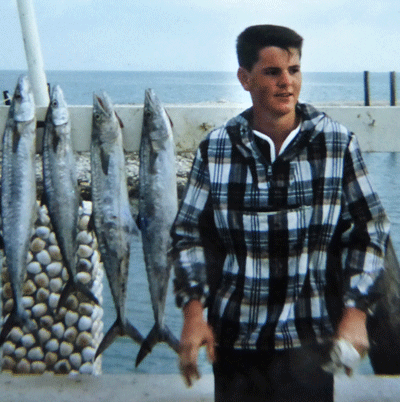 |
Trip to Florida deep sea fishing. |
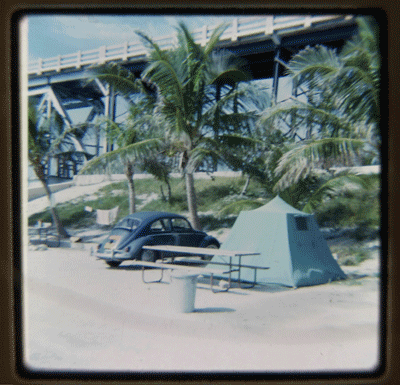 |
Camping on Florida Keys |
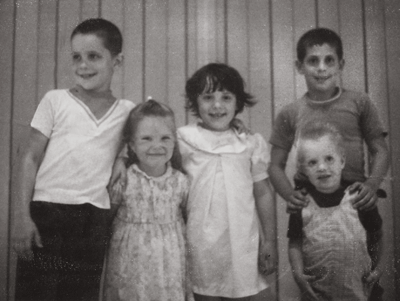 |
| Nieces and nephews, Rick, Karen, Natalie, David and Jeff. |
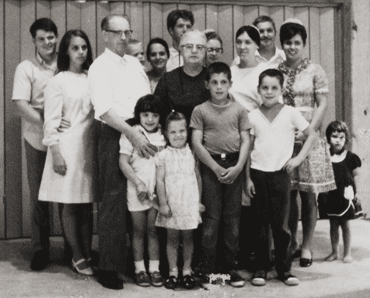 |
Family line up. Unidentified little girl joins in on the right. |
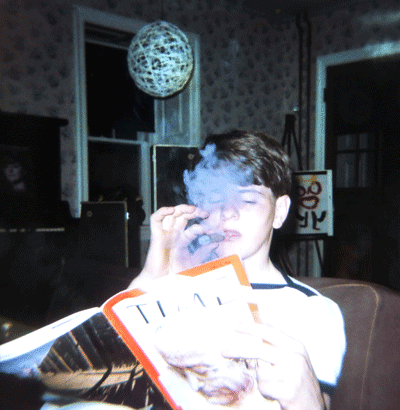 |
Relaxing with cigar (showing off) |
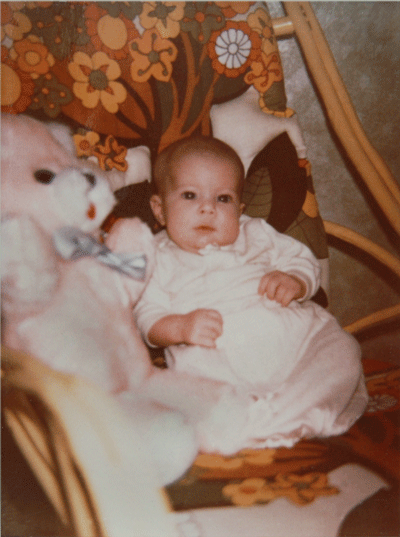 |
Nicole arrives, 1973 |
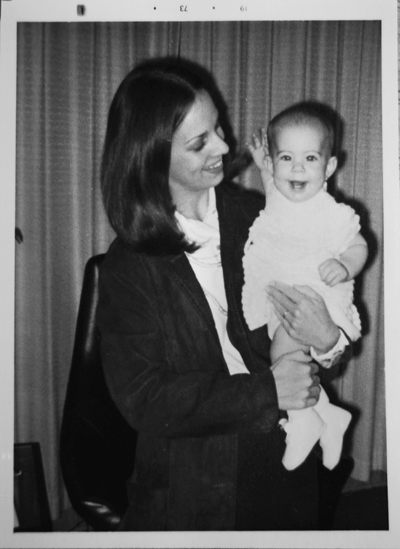 |
Doris holding Nicole |
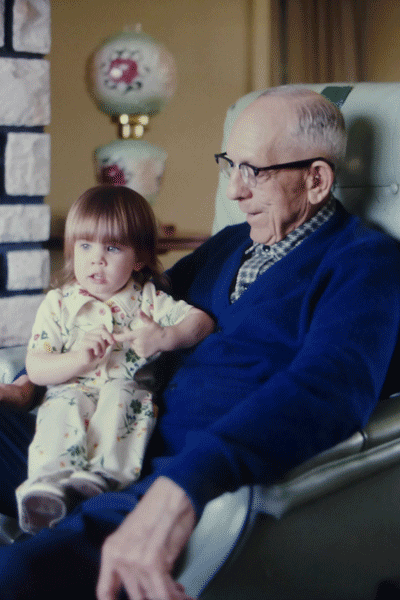 |
Nicole with Great Grandpap Cordell, 1975 |
|







